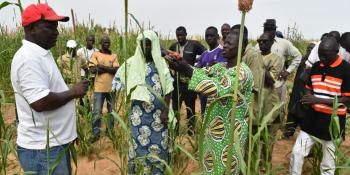Agriculture Advantage 2.0 at COP24 | Policy advantage: Enablers for food systems transformation

Explore innovations in policy making and implementation which can drive a food systems transformation.
Objective
To identify best practices in policy making and implementation which can drive a food systems transformation under climate change.
Overview
Food systems are diverse, with a range of different stakeholders from smallholder farmers to multinational corporations to consumers with varied demands. A transformation in food systems will need to enable these stakeholders to take transformative actions which can collectively realise a food secure and sustainable future in a changing climate. Policies and incentives will be key to enabling action amongst these diverse stakeholders.
To realize a transformation, policy change is needed beyond agriculture strictly as a means of food production, to include extension services, land rights, seeds, food safety and dietary guidelines, trade, market regulations, and technology. For some countries, transformation in agriculture and food systems will mean a transformational change in the economy itself. However, such changes will occur with trade-offs between stakeholders, and it is essential that policies that galvanize transformation is grounded in a commitment to equity and sustainability.
Pathways to achieving policy change will be a critical means of demonstrating this commitment and therefore must engage the wide range of stakeholders in food systems. This event will discuss key pathways which have proved successful in different contexts and generate lessons to foster a conducive enabling environment for food systems transformation.
Tentative program
Speaker | Agenda | Duration |
Anette Friis, Head of Partnerships and Outreach, CCAFS | Welcome and introductions | 10 mins |
Vitumbiko Chinoko, Advocacy and Partnership Coordinator, Climate Change, Food and Nutrition Security, CARE International | Keynote presentation: The policy advantage for food systems transformation | 10 mins |
Presentation of country case studies | ||
Alan Nicol, Sustainable Growth Program Lead, International Water Management Institute (IWMI) | Case 1: Agricultural systems transformation through renewable energy policy interventions | 8 mins |
Alessandro Aduso, Senior Policy Analyst, International Environment at Ministry for Primary Industries (MPI), New Zealand | Case 2: Food systems transformation through ICT policy interventions | 8 mins |
Julia Wolf, Natural Resources Officer, Climate Change Adaptation, FAO | Case 3: Food systems transformation through demand-side policy interventions | 8 mins |
Theo de Jager, President, World Farmers Organization (WFO) - tbc | Case 4: Enabling regional transformations through South-South cooperation | 8 mins |
Moderated Q&A and discussion Moderator: Una May Gordon, Principal Director, Climate Change, Ministry of Economic Growth and Job Creation, Jamaica | 30 mins | |
Victoria Hatton, Senior Policy Analyst, International Policy Division, Ministry for Primary Industries, New Zealand | Closing remarks | 10 mins |

This event is part of the Agriculture Advantage 2.0 event series at COP24, a collaborative effort of more than 15 organizations with the mission to transform agricultural development in the face of climate change. Click here to see the series of events at COP24.
Related resources:
- Website: The Climakers: Farmers Driven Climate Change Agenda
- CCAFS briefing: A 6-part action plan to transform food systems under climate change, available in 2 formats: Exposure story with animated graphics | downloadable Info Note
- CCAFS journal article: Structural change as a key component for agricultural non-CO2 mitigation efforts
- CCAFS journal article: Reducing greenhouse gas emissions in agriculture without compromising food security?
Find out what happened at the event:
- Summary blog: Policy Advantage: Enabling a food systems transformation


